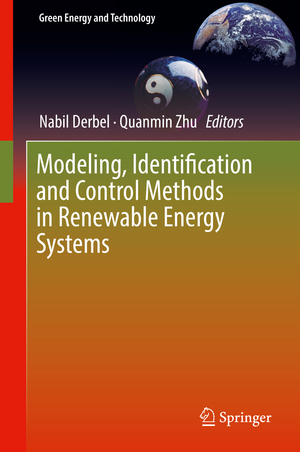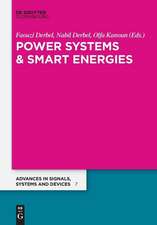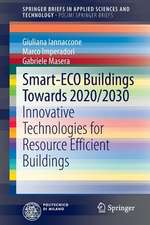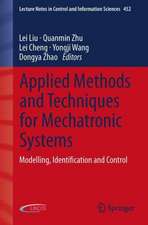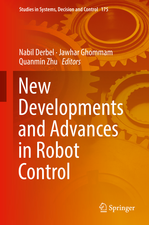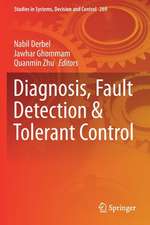Modeling, Identification and Control Methods in Renewable Energy Systems: Green Energy and Technology
Editat de Nabil Derbel, Quanmin Zhuen Limba Engleză Hardback – 14 ian 2019
Din seria Green Energy and Technology
- 18%
 Preț: 943.43 lei
Preț: 943.43 lei - 20%
 Preț: 629.52 lei
Preț: 629.52 lei - 18%
 Preț: 1124.92 lei
Preț: 1124.92 lei - 18%
 Preț: 947.35 lei
Preț: 947.35 lei - 15%
 Preț: 655.92 lei
Preț: 655.92 lei - 18%
 Preț: 957.62 lei
Preț: 957.62 lei - 18%
 Preț: 789.52 lei
Preț: 789.52 lei - 17%
 Preț: 464.56 lei
Preț: 464.56 lei - 15%
 Preț: 645.79 lei
Preț: 645.79 lei - 18%
 Preț: 903.93 lei
Preț: 903.93 lei - 24%
 Preț: 1322.09 lei
Preț: 1322.09 lei - 18%
 Preț: 890.54 lei
Preț: 890.54 lei - 18%
 Preț: 1115.46 lei
Preț: 1115.46 lei - 18%
 Preț: 1117.03 lei
Preț: 1117.03 lei - 18%
 Preț: 949.73 lei
Preț: 949.73 lei - 18%
 Preț: 892.11 lei
Preț: 892.11 lei - 15%
 Preț: 648.24 lei
Preț: 648.24 lei - 18%
 Preț: 997.09 lei
Preț: 997.09 lei - 15%
 Preț: 579.81 lei
Preț: 579.81 lei - 18%
 Preț: 1123.15 lei
Preț: 1123.15 lei - 18%
 Preț: 961.41 lei
Preț: 961.41 lei - 17%
 Preț: 490.23 lei
Preț: 490.23 lei - 18%
 Preț: 904.60 lei
Preț: 904.60 lei - 15%
 Preț: 643.34 lei
Preț: 643.34 lei -
 Preț: 287.91 lei
Preț: 287.91 lei - 24%
 Preț: 634.05 lei
Preț: 634.05 lei -
 Preț: 379.40 lei
Preț: 379.40 lei - 18%
 Preț: 783.20 lei
Preț: 783.20 lei - 18%
 Preț: 956.09 lei
Preț: 956.09 lei - 18%
 Preț: 1394.84 lei
Preț: 1394.84 lei - 18%
 Preț: 1691.57 lei
Preț: 1691.57 lei - 15%
 Preț: 592.61 lei
Preț: 592.61 lei - 18%
 Preț: 952.09 lei
Preț: 952.09 lei - 18%
 Preț: 944.19 lei
Preț: 944.19 lei - 18%
 Preț: 891.33 lei
Preț: 891.33 lei - 18%
 Preț: 1252.44 lei
Preț: 1252.44 lei - 18%
 Preț: 789.52 lei
Preț: 789.52 lei - 20%
 Preț: 566.30 lei
Preț: 566.30 lei - 18%
 Preț: 1112.48 lei
Preț: 1112.48 lei - 18%
 Preț: 1114.24 lei
Preț: 1114.24 lei - 18%
 Preț: 1113.71 lei
Preț: 1113.71 lei - 18%
 Preț: 1011.45 lei
Preț: 1011.45 lei - 24%
 Preț: 590.60 lei
Preț: 590.60 lei - 20%
 Preț: 567.50 lei
Preț: 567.50 lei - 24%
 Preț: 907.50 lei
Preț: 907.50 lei - 18%
 Preț: 952.89 lei
Preț: 952.89 lei
Preț: 900.18 lei
Preț vechi: 1097.78 lei
-18% Nou
Puncte Express: 1350
Preț estimativ în valută:
172.27€ • 187.06$ • 144.71£
172.27€ • 187.06$ • 144.71£
Carte tipărită la comandă
Livrare economică 22 aprilie-06 mai
Preluare comenzi: 021 569.72.76
Specificații
ISBN-13: 9789811319440
ISBN-10: 9811319448
Pagini: 380
Ilustrații: VIII, 372 p. 322 illus., 151 illus. in color.
Dimensiuni: 155 x 235 mm
Greutate: 0.71 kg
Ediția:1st ed. 2019
Editura: Springer Nature Singapore
Colecția Springer
Seria Green Energy and Technology
Locul publicării:Singapore, Singapore
ISBN-10: 9811319448
Pagini: 380
Ilustrații: VIII, 372 p. 322 illus., 151 illus. in color.
Dimensiuni: 155 x 235 mm
Greutate: 0.71 kg
Ediția:1st ed. 2019
Editura: Springer Nature Singapore
Colecția Springer
Seria Green Energy and Technology
Locul publicării:Singapore, Singapore
Cuprins
Emulation of Wind Turbine for Standalone Wind Energy Conversion Systems.- The ripple correlation optimal point determination in a medium power wind conversion system and performance evaluation with respect to conventional algorithms.- Direct Power Control of DFIG Using Sliding Mode Control Approach.- Photovoltaic power prediction using recurrent neural network.- Control of Wind Turbine based on PMSG using Pitch Angle Control.- Feedback T-S fuzzy controller in finite frequency for wind turbine.- Control of Power of a DFIG Generator with MPPT Technique for Wind Turbines Variable Speed.- A Comparative study between PI and sliding mode control for the DFIG of a wind turbine.- A comprehensive Comparison of two Behavior MPPT Techniques, the Conventional (Incremental Conductance (INC)) and Intelligent (Fuzzy Logic Controller (FLC)) for Photovoltaic Systems.- Modeling and performance analysis of a solar PV power system connected to a three phase load under irradiation and load variations.- Intelligent Load Frequency Control in Presence of Wind Power Generation.- ZedBoard-FPGA Control of the DFIG based Wind Power System.- An FPGA-based control of the PMSG on Variable Wind Speed Turbine.- Modeling and Comparison of Boost Converter With Cascaded Boost Converters.- Fault Tolerant Control of Switch Power Converter In WECS Based on a DFIG.- SSDI-Max control and its applications in renewable.- Nonlinear Control of variable speed Wind Energy Conversion System based PMSG.
Notă biografică
Nabil Derbel is Professor in Control Systems Theory at the Electrical Engineering Department of The "National Engineering School of Sfax", University of Sfax, Tunisia. He received his engineering Diploma from the "Ecole Nationale d'Ingénieurs de Sfax" in 1986, the "Diplôme d'Etudes Approfondies" in Automatic control from the "Institut National des Sciences Appliquées de Toulouse" in 1986, the "Doctorat d'Université" degree from the "Laboratoire d'Automatique et d'Analyse des Systèmes de Toulouse" in 1989, and the "Doctorat d'Etat" degree from the" Ecole Nationale d'Ingénieurs de Tunis". His current interests include: Optimal Control, Sliding Mode Control, Complex Systems, Fuzzy Logic, Neural Networks. He is the author and the co-author of more than 80 papers published in international Journals and of more than 500 papers published in international conferences. Currently, Professor Derbel is associate editor of International Journal of Modeling, Identification and Control, the editor ofInternational Journal of Digital Signals and Smart Systems, and co-editor (and co-founder) of Transactions on Systems, Signals & Devices, an International Journal, which has been renamed in 2017 as Advances in Systems, Signals & Devices. He has edited a book for Springer entitled "Applications of sliding mode control", in 2017.
Quanmin Zhu is Professor in control systems at Department of Engineering Design and Mathematics, University of the West of England, Bristol, UK. He obtained his MSc. in Harbin Institute of Technology, China in 1983 and PhD in Faculty of Engineering, University of Warwick, UK in 1989. His main research interest is in the area of nonlinear system modelling, identification, and control. He has published over 160 papers on these topics and provided consultancy to various industries. Currently Professor Zhu is acting as member of editorial board of International Journal of Systems Science, member of editorial board of Chinese Journal of Scientific Instrument, editor (and founder) of International Journal of Modelling, Identification and Control, and editor of International Journal of Computer Applications in Technology.
Textul de pe ultima copertă
Most of the research and experiments in the fields of modeling and control systems have spent significant efforts to find rules from various complicated phenomena by principles, observations, measured data, logic derivations. The rules are normally summarized as concise and quantitative expressions or “models”. “Identification” provides mechanisms to establish the models and “control” provides mechanisms to improve system performances.
This book reflects the relevant studies and applications in the area of renewable energies, with the latest research from interdisciplinary theoretical studies, computational algorithm development to exemplary applications. It discusses how modeling and control methods such as recurrent neural network, Pitch Angle Control, Fuzzy control, Sliding Mode Control and others are used in renewable systems. It covers topics as photovoltaic systems, wind turbines, maximum power point tracking, batteries for renewable energies, solar energy, thermal energy and so on. This book is edited and written by leading experts in the field and offers an ideal reference guide for researchers and engineers in the fields of electrical/electronic engineering, control system and energy.
Caracteristici
Presents the latest research from interdisciplinary theoretical studies, computational algorithm development to exemplary applications Illustrates how control principles and methods are used in renewable energy systems Selected and extended papers presented at the 14th International Multi-Conference on Systems, Signals & Devices (SSD), March 28 - 31, 2017, Marrakech, Morocco Covers relevant studies and applications of renewable energies
